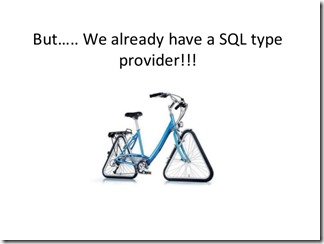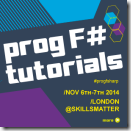2014 has been another crazy year for the F#unctional Londoners meetup with over 20 sessions already. Thanks to our hosts Skills Matter we’ve been able to hold a meetup roughly once every 2 weeks.
Here’s a run down of the year so far and what’s coming up.
January
Ross kicked off the year with a deep dive to his LINQ enabled erasing SQL Type Provider.
Following on, in May, Ross left the sunny shores of Southend to tour the east coast with the talk covering NYC, Washington DC and Nashville along the way.

First seen at DunDDD in Dundee, Anthony’s excellent talk went on to be featured at CodeMesh London too.
With F# built-in to Xamarin Studio you can easily target iOS, Android and Mac.
February
Tomas returned to London to talk about his work on Deedle while at Blue Mountain Capital in New York.
As a follow on from the talk Tomas ran a hands on session using Deedle to explore world climate, the titanic, stock market trends and finally US debt.
March
There was a huge turnout for Scott’s hugely informative and at times somewhat amusing talk first seen at NDC London.

Eirik Tsarpalis and Jan Dzik, from Nessos, presented their work on MBrace a programming model and cluster infrastructure for effectively defining and executing large scale computation in the cloud.
In this hands on treasure hunt session, Tomas presented a series of data extraction tasks using type providers to find words to build a sentence.
April
Rob Lyndon introduced Deep Belief Networks and his GPU based implementation in Vulpes. This talk was repeated last week at the prestigious Strangeloop conference in St Louis!
May
Michael travelled up from Brighton for a hands on session on building type providers. Type Providers are a hot topic in the London group with a number of popular type providers produced by members including FSharp.Data, SQLProvider and Azure Storage.
Mixing biology and physics to understand stem cells and cancer (video)
Ben Hall from Microsoft Research Cambridge gave a fascinating talk about his work with a hybrid simulator in F# to explore how stem cells grow (and some worms!).
Stephen Channell gave a repeat of his excellent talk featured at FP Days and the F# in Finance conference on liquidity risk.
Ian was in town to run a session at the Progressive .Net Tutorials and gave a repeat of his excellent talk from DDD North.
June
F#unctional Londoners regular Isaac, aka the Cockney Coder, talked about his professional work with Azure including his Azure Storage type provider.
In this hands on session we used the material from Mathias Brandewinder’s session in San Francisco to have some fun drawing fractal trees.
In this session Gabriele Cocco talked about his work on FSCL, an F# to OpenCL compiler.
July
Borrowing material from Mathias again, we built a 2048 bot using the open source web testing library Canopy.
Grant popped down from Leeds to run a fun code golf session where the aim was to complete a task with the least number of characters.
August
Phil Nash talked about how he was using F# scripting at work along side his some of his C++ projects.
In this hands on session we looked at the popular parser combinator library FParsec, building a mini-Logo parser and interpreter.
September
James popped down from Edinburgh to talk about his work with Philip Wadler on the open source project FSharp.Linq.ComposableQuery.
Goswin Rothenthal talked about his work using FSharp scripting in the design of the Abu Dhabi Louvre building:

Coming up this Wednesday we have Evelina talking about some of her data science work at Cambridge.
November
On November 6-7th the Progressive F# Tutorials make a return with expert speakers including Don Syme, Tomas Petricek, Mark Seemann, Andrea Magnorsky, Michael Newton, Jérémie Chassaing, Mathias Brandewinder, Scott Wlaschin and Robert Pickering.
 Don’t miss the special offer that runs up to the end of Evelina’s talk giving a 20% discount to members, brining the price down to a barmy 200GBP, use code F#UNCTIONAL-20.
Don’t miss the special offer that runs up to the end of Evelina’s talk giving a 20% discount to members, brining the price down to a barmy 200GBP, use code F#UNCTIONAL-20.